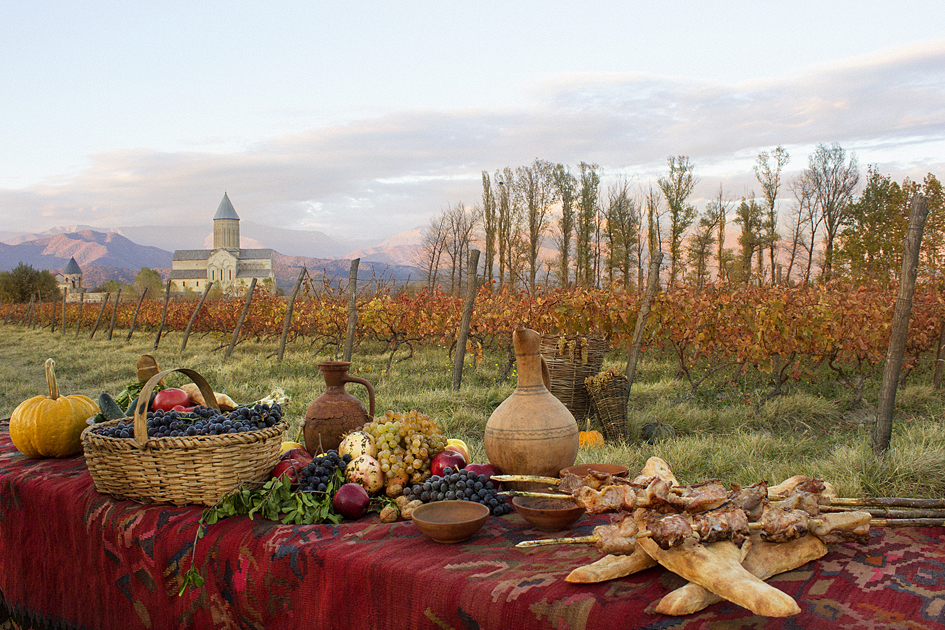Georgian Culture
Georgia’s culture has grown along with the country’s long history, giving its unique customs and traditions. While some traditions have been long forgotten, there are still many of those beautiful traditions left that Georgians cherish and pass on from generation to generation.

Georgian Tradition
Georgian people respect their traditions and will estimate your attentive attitude to their customs. For centuries Georgian people developed traditions of hospitality. Love and boundless respect for guests, devotion to the host’s duties, a traditional feast is passed from one generation to another. As a result, Georgian culture is distinguished by high culture of hospitality.

Georgians have a tradition of hosting big dinners called “Supras”, during which a table is fully decorated by different dishes, and people sit around it for hours. The organizer of the Supra is called the Tamada or the toast-maker who is in charge of keeping the audience engaged at the table. Supra revolves around many toasts, where a Tamada talks for several minutes.

New Year in Georgia
As Georgia is an Orthodox Christian country, it follows the Julian calendar. Therefore, the nation celebrates a New Year holiday twice in a year, on January 1, as the rest of the world, and on January 13. According to the calendar, the New Year falls on the latter date, which locals call the “Old New Year.” The most important New Year celebration comes on December 31, when families sit around the table very late in the evening and have a proper meal. Everyone starts congratulating each other at midnight, the time when it’s considered to be the “official” New Year.

Georgian Feast Tradition
Georgian feast is one of the most important traditions in Georgian culture. Nowadays it’s one of the strongest identification features of Georgian people. The structure of the Georgian feast is very plain; Its elements are wine, bread (generally with the meaning of food), toasts, and songs. A harmonious mixture of these four elements makes the whole Georgian feast. Though the tradition of Georgian Feast differentiates according to each region (Guria, Kakheti, Imereti, etc.)
The tradition of wine is closely connected to the tradition of the feast – Georgian people were establishing the culture of wine during thousands of centuries, working out various types of wine. This fact is proved by archeological materials found on Georgian territory: clay pitchers, golden, silver, and bronze bowls, and many other things.

The Georgians are a proud people with an ancient culture. They have through the ages been noted as warriors as well as for their hospitality, love of life, lively intelligence, sense of humor, and reputed longevity.

Georgian Language
Georgian is the primary language of about 3.9 million people in Georgia itself (83% of the population) and of another 500,000 abroad (in countries such as Turkey, Iran, Russia, the USA, and Europe). The culture of Georgia has evolved over the country’s long history, providing it with a unique national culture and a strong literary tradition based on the Georgian language and alphabet. It is the literary language for all ethnographic groups of Georgian people, especially those who speak other South Caucasian languages (or Kartvelian languages): Svans, Megrelians, and the Laz.
Most Georgians belong to the Georgian Orthodox (65%), Russian Orthodox (10%), or Armenian Apostolic (8%) churches. Although religion does not overtly impact the culture, behavior, or etiquette, the values do on a subtle level appear in outlook and also areas such as treatment of guests.
Georgian Culture

Georgian music culture is acknowledged in many countries of the world. composers G. Kancheli, S. Tsintsadze, S. Nasidze, Conductor – J. Kakhidze, Violinists – L. Isakadze, M. Iashvili, Piano players – E. Virsaladze, L. Toradze, Singer – P. Burchuladze, laureate of a number of international competitions – Georgian State String Quartet, Georgian State Chamber Music Orchestra enjoy the success in the leading concert halls of the world.
Folk music, namely polyphonic choir performance traditions, has a special place among the cultural values of the Georgian people. Georgian folk music can be considered unique without any exaggeration in the world music culture.
The first Georgian literary monuments are related to the 5th century AD. It is church literature of early Christianity – lives of the martyrs and saints, various treatises. Later went folklore – legends about heroes and didactic poems.

Georgian painting is represented by the works of such masters as legendary Niko Pirosmani, Gigo Gabashvili, David Kakabadze, Lado Gudiashvili, Cornelius Sanadze, Elena Akhvlediani, Sergey Kobuladze, Simon Virsalasze, and Ekaterina Bagdavadze.
Famous Georgian sculptors include Elgudzha Amashukeli, Irakli Ochiauri, and Zurab Tsereteli. Georgian dramaturgy goes back to the mid-19th century. Its founder is the writer, translator, and theater figure Georgi Eristavi (1811–1864).

Georgia has about 100 museums. In Tbilisi, there are more than 20 of them. The major museum of the country is the State Museum of Georgia named after Simon Dzhanashia transformed in 1919 from the Caucasian Museum (founded in 1852).


